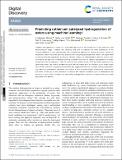Files in this item
Predicting ruthenium catalysed hydrogenation of esters using machine learning
Item metadata
| dc.contributor.author | Mishra, Challenger | |
| dc.contributor.author | Wolff, Niklas von | |
| dc.contributor.author | Tripathi, Abhinav | |
| dc.contributor.author | Brodie, Claire N | |
| dc.contributor.author | Lawrence, Neil D. | |
| dc.contributor.author | Ravuri, Aditya | |
| dc.contributor.author | Brémond, Éric | |
| dc.contributor.author | Preiss, Annika | |
| dc.contributor.author | Kumar, Amit | |
| dc.date.accessioned | 2023-05-15T16:30:14Z | |
| dc.date.available | 2023-05-15T16:30:14Z | |
| dc.date.issued | 2023-06-01 | |
| dc.identifier | 285263746 | |
| dc.identifier | 9168663a-cd19-46c8-aa8e-c6792ab259db | |
| dc.identifier | 85168659328 | |
| dc.identifier.citation | Mishra , C , Wolff , N V , Tripathi , A , Brodie , C N , Lawrence , N D , Ravuri , A , Brémond , É , Preiss , A & Kumar , A 2023 , ' Predicting ruthenium catalysed hydrogenation of esters using machine learning ' , Digital Discovery , vol. 2 , no. 3 , pp. 819-827 . https://doi.org/10.1039/D3DD00029J | en |
| dc.identifier.issn | 2635-098X | |
| dc.identifier.other | RIS: urn:FE86082D2F43F2ECE454F197B2EE350E | |
| dc.identifier.other | ORCID: /0000-0002-8175-8221/work/134491240 | |
| dc.identifier.uri | https://hdl.handle.net/10023/27623 | |
| dc.description | Funding: AK thanks the Leverhulme Trust for an early career fellowship (ECF-2019-161). AK and CNB thank the UKRI Future Leaders Fellowship (MR/W007460/1). NVW and EB thank the IdEx Université de Paris (ANR-18-IDEX-0001) for funding. CM is supported by a Fellowship by the Accelerate Program for Scientific Discovery at the Computer Laboratory, University of Cambridge. The authors acknowledge the GENCI-CINES center for HPC resources (Projects A0080810359, A0100810359, and AD010812061R1). | en |
| dc.description.abstract | Catalytic hydrogenation of esters is a sustainable approach for the production of fine chemicals, and pharmaceutical drugs. However, the efficiency and cost of catalysts are often bottlenecks in the commercialization of such technologies. The conventional approach to catalyst discovery is based on empiricism, which makes the discovery process time-consuming and expensive. There is an urgent need to develop effective approaches to discover efficient catalysts for hydrogenation reactions. In this work, we develop a machine learning approach aided by Gaussian Processes to predict outcomes of catalytic hydrogenation of esters. Results of the Gaussian Process are compared with Linear regression and Neural Network models. Our optimized models can predict the reaction yields with a root mean square error (RMSE) of 12.1% on unseen data and suggest that the use of certain chemical descriptors (e.g. electronic parameters) selectively can result in a more accurate model. Furthermore, studies have also been carried out for the prediction of catalysts and reaction conditions such as temperature and pressure as well as their validation by performing hydrogenation reactions to improve the poor yields described in the dataset. | |
| dc.format.extent | 9 | |
| dc.format.extent | 1115442 | |
| dc.language.iso | eng | |
| dc.relation.ispartof | Digital Discovery | en |
| dc.subject | QD Chemistry | en |
| dc.subject | DAS | en |
| dc.subject | MCC | en |
| dc.subject.lcc | QD | en |
| dc.title | Predicting ruthenium catalysed hydrogenation of esters using machine learning | en |
| dc.type | Journal article | en |
| dc.contributor.sponsor | The Leverhulme Trust | en |
| dc.contributor.sponsor | Medical Research Council | en |
| dc.contributor.institution | University of St Andrews. School of Chemistry | en |
| dc.identifier.doi | 10.1039/D3DD00029J | |
| dc.description.status | Peer reviewed | en |
| dc.identifier.grantnumber | ECF-2019-161 | en |
| dc.identifier.grantnumber | MR/W007460/1 | en |
This item appears in the following Collection(s)
Items in the St Andrews Research Repository are protected by copyright, with all rights reserved, unless otherwise indicated.

